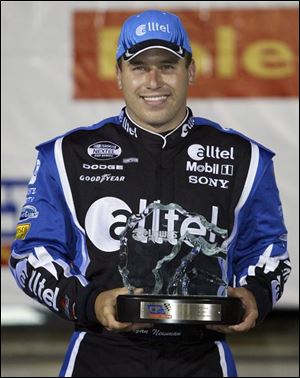
Newman knows cars, inside and out
6/3/2005
Ryan Newman
If his crew chief tells Ryan Newman that, after calibrating his race car's suspension geometry, he wants to raise the track bar to minimize understeer, Newman will know exactly what his chief is talking about. If his chief tells Newman that the flux capacitor is not fluxing, then Newman knows they are feeding him a bunch of bologna.
When the topic is race cars and the physics involved in making them go fast, it is hard to fool a Purdue grad with a degree in vehicle structural engineering. Newman knows his sport, inside and out, cover to cover.
"You know, I can take any race car apart and put it back together by myself, without a doubt," Newman said. "But to be able to understand what's happening when you're driving around the racetrack, you know, is one of the harder things. Describing that to the team in order for them to make the car go faster, because I don't make all those decisions, is what makes the difference."
Newman, who led the Nextel Cup Series with eight wins and 11 poles in 2003 after winning rookie of the year honors in 2002, said his college background makes him a better communicator when he has to relay the fine points of the car's performance to his crew.
"I think when I'm sitting in the car after we make a run and talking to the guys, I think I have a different way of describing what's happening to the car, in a way that as a team we can get farther forward," he said.
"I've always said the engineering degree has helped mostly with the language that I've learned to understand from a physics standpoint, to describe what's happening in the car. Obviously, it helps to understand the car itself. My college degree didn't necessarily help with that, but it helped to understand what was happening, and why."
Newman, who will make his 129th Cup start this Sunday when he puts his No. 12 Alltel Dodge in the field at Dover International Speedway, said his background gives him a greater appreciation for the advancements in the sport, especially developments like the SAFER barrier, which allows the wall surrounding the race track to absorb much of the energy when a car strikes it.
"The SAFER barrier has been a blessing for every race car driver that gets to race against the wall that has that," Newman said. "I am extremely grateful for the design of it, for the process and how things are. You know, like all things, nothing is perfect, but it's definitely a huge step in the right direction."
The Indiana native and his Alltel team have been on a hot streak lately, scoring top-five finishes in the past three Cup races. That streak has allowed Newman to move up 11 positions in the point standings over the past three weeks.
"That's a big positive, but there's always room for improvement, in every team," Newman said. "We definitely have room for improvement because we haven't been to victory lane yet. We were hot and cold for the first eight races this season. The past five we've definitely stepped it up. We're a lot better right now than what people are giving us credit for. Hopefully this weekend, that fire will ignite again and get us to victory lane."
Newman, who has finished in the top 10 in the Nextel Cup Series championship in all three seasons he has raced on the circuit, said he does not want to see changes in the NASCAR rules that will further limit the driver's impact on the race.
"I think that the less downforce we have on the cars, the more the driver has to drive the race car, which is good from my perspective, because I'm happy driving the race car as hard as I can every time," Newman said.
"People have been asking me about the speeds - they were asking me if the speeds were too fast. My answer is, we could put on a great show running 65 miles an hour around here in rental cars. It's different. It's not the sport that we're in. It all depends on what you're after."
With that, Newman was off into another lengthy discussion of the dearth of physics involved in bringing a race car through a turn under control while not sacrificing too much momentum or speed.
"You know, there's a lot more to this than just a race car that's capable of going fast," he said.
His professors in the vehicle structural engineering program at Purdue would be proud of that assessment.
Contact Matt Markey at:
mmarkey@theblade.com
or 419-724-6510.